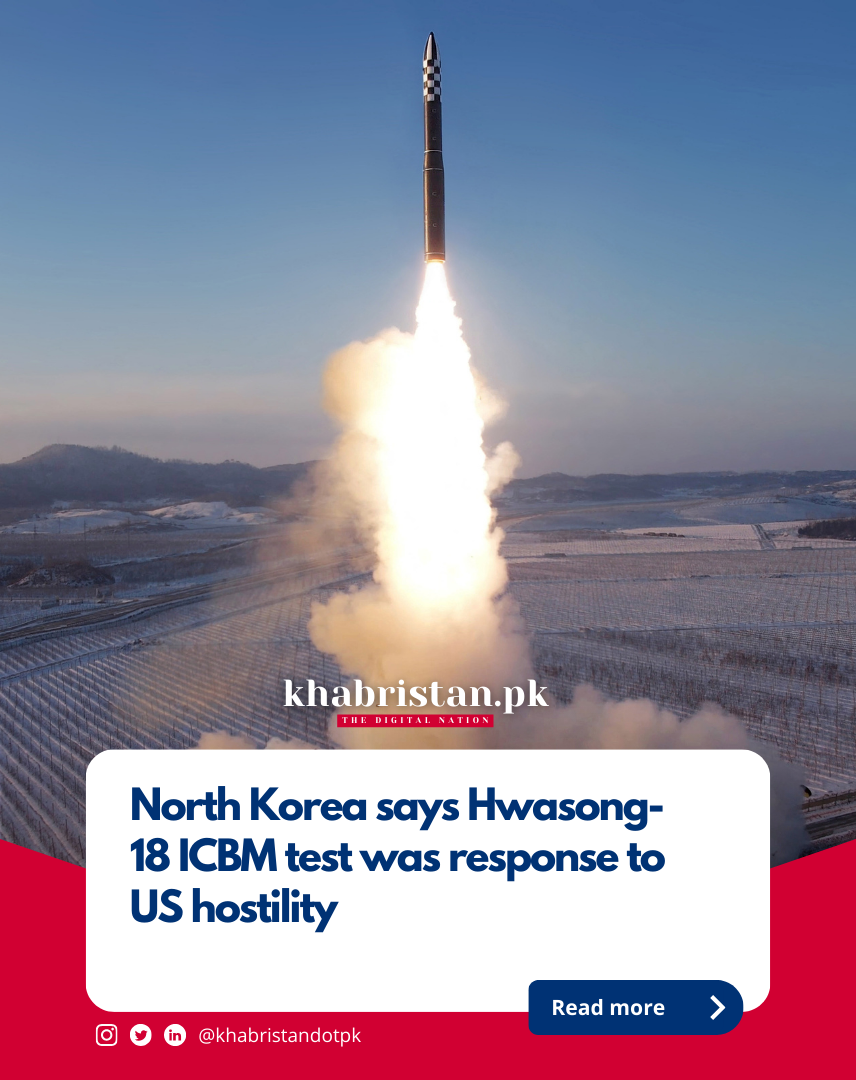North Korea conducted a test of its new ICBM, the Hwasong-18, stating it was a response to US hostility. Leader Kim Jong Un supervised the launch, emphasizing the country’s readiness for military confrontation. The launch was condemned by South Korea, Japan, and the US, leading to a UN Security Council meeting. China also held discussions with North Korea. – Khabristan.PK

SEOUL: North Korea said on Tuesday it had tested the isolated state’s newest ICBM on Monday to gauge the war readiness of its nuclear force against mounting US hostility, as Washington and its allies began operating a real-time missile data sharing system.
North Korean state media said leader Kim Jong Un watched Monday’s launch of the Hwasong-18 intercontinental ballistic missile (ICBM) at a site east of the capital, Pyongyang.
The missile reached an altitude of 6,518 km (4,050 miles), flying 1,002 km and accurately hitting the intended target, an empty patch of sea, state media said.
Kim said the launch sends “a clear signal to the hostile forces, who have fanned up their reckless military confrontation hysteria” against the North, state news agency KCNA reported.
Kim said the drill “displayed the DPRK’s will for toughest counteraction and its overwhelming strength”. DPRK is short for the Democratic People’s Republic of Korea.
He presented “some new important tasks for accelerating the development of the DPRK’s nuclear strategic forces”, KCNA said, without elaborating.
South Korea and Japan said that based on Monday’s flight data, the North had fired an ICBM with the range to hit anywhere in the United States. The launch was condemned by South Korea, Japan and the United States as a flagrant violation of UN Security Council resolutions.
On the same day, China, a Security Council permanent member that has previously approved sanctions against Pyongyang, held a high-level meeting with North Korea in Beijing, discussing cooperation and issues of “common concern” in “a friendly atmosphere,” the countries’ state media said.
The UN Security Council is due to meet on Tuesday at the request of the United States and other countries to discuss the launch.
South Korean President Yoon Suk Yeol, who has taken a hard line against Pyongyang since taking office last year, said Kim Jong Un’s regime “will come to realise provocative actions will only bring greater pain to itself”.
Recently, North Korea conducted a test of the Hwasong-18 intercontinental ballistic missile (ICBM) and stated that it was in response to perceived hostility from the United States. This event has once again brought the complex relationship between these two nations into the spotlight. The Hwasong-18 ICBM is reported to be one of the largest road-mobile missiles ever developed, signaling North Korea’s advancements in its missile capabilities. The test has raised concerns globally and underlines the importance of diplomatic efforts to address tensions in the region.
It is crucial to understand the context and implications of this ICBM test. North Korea’s claim of self-defense and response to perceived US hostility emphasizes the delicate balance of power and historical animosities in the region. It also highlights the need for transparent communication and de-escalation efforts to prevent further tensions. It is essential for the international community to engage in constructive dialogue to ensure stability and peace.
As discussions unfold and diplomatic efforts continue, it is imperative for all stakeholders to prioritize open dialogue and peaceful resolutions. The Hwasong-18 ICBM test serves as a sobering reminder of the geopolitical complexities and the importance of earnest diplomatic engagement. Through collaborative and deliberate actions, the international community can strive towards fostering stability and fostering a peaceful future for all nations involved.
North Korea, in response to perceived US hostility, conducted a test of its latest ICBM, the Hwasong-18, to assess its nuclear force’s preparedness. The missile, launched near Pyongyang, reached an altitude of 6,518 km and traveled 1,002 km, hitting its intended target in the sea. Leader Kim Jong Un emphasized the message it sends to “hostile forces” and outlined new tasks for advancing the country’s nuclear strategic forces. The test drew condemnation from South Korea, Japan, and the US, with the UN Security Council set to convene for discussions. Meanwhile, China held high-level talks with North Korea in a “friendly atmosphere.”
Disclaimer:
This content is AI-generated using IFTTT AI Content Creator. While we strive for accuracy, it’s a tool for rapid updates. We’re committed to filtering information, not reproducing or endorsing misinformation. – Khabristan.pk for more information visit privacy policy








Leave a Comment